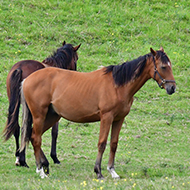
Blanket treatments for drug-resistant equine worms are no longer recommended.
The first set of cross-sector guidelines for prescribers on equine worm control has been launched to tackle the rise in wormer resistance.
Developed by CANTER (Controlling ANTiparasitic Resistance in Equines Responsibly), the guidelines outline key principles to support vets, pharmacists, and SQPs in their prescribing decisions. They also recommend sustainable strategies for parasite control to equine clients.
CANTER chair Alison Pyatt, who launched the guidelines at the Equine Infectious Disease meeting (3 October), said: "Publishing the first edition of these industry-agreed guidelines is a seminal moment in the life of CANTER and our work to address the very real threat posed by anthelmintic resistance.
"Our intention is for them to be a free, easily accessible, live resource that underpins our first aim, to support prescribers with practical, evidence-based principles to slow wormer resistance."
The guidelines draw on the expertise of international authorities on equine health and parasitology to promote a consistent approach across prescriber groups. They state that repeated blanket treatments for drug-resistant worms are no longer recommended, and that prescribers should now consider alternative approaches, including:
- applying pasture and horse management strategies to reduce parasite infection in the environment and break worm transmission cycles
- using monitoring tools such as worm egg counts to inform the need to treat individuals shedding higher levels of eggs and to monitor for resistance
- applying a risk-based approach to estimate parasite transmission potential in individual horses.
"Antiparasitic resistance is a critical and growing threat to equine health and welfare, so the publication of the CANTER guidelines as key principles for equine parasite control is a huge step forward in tackling this crisis," commented World Horse Welfare’s chief executive, Roly Owers.
"We have no doubt that the much-anticipated publication of the guidelines will be essential in promoting clarity and consistency in the approach to sustainable equine parasite control."



 A set of international guidelines for disease surveillance in wildlife has been updated for the first time since 2015.
A set of international guidelines for disease surveillance in wildlife has been updated for the first time since 2015.